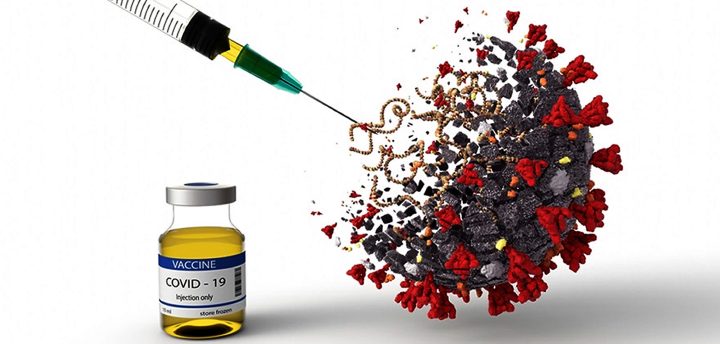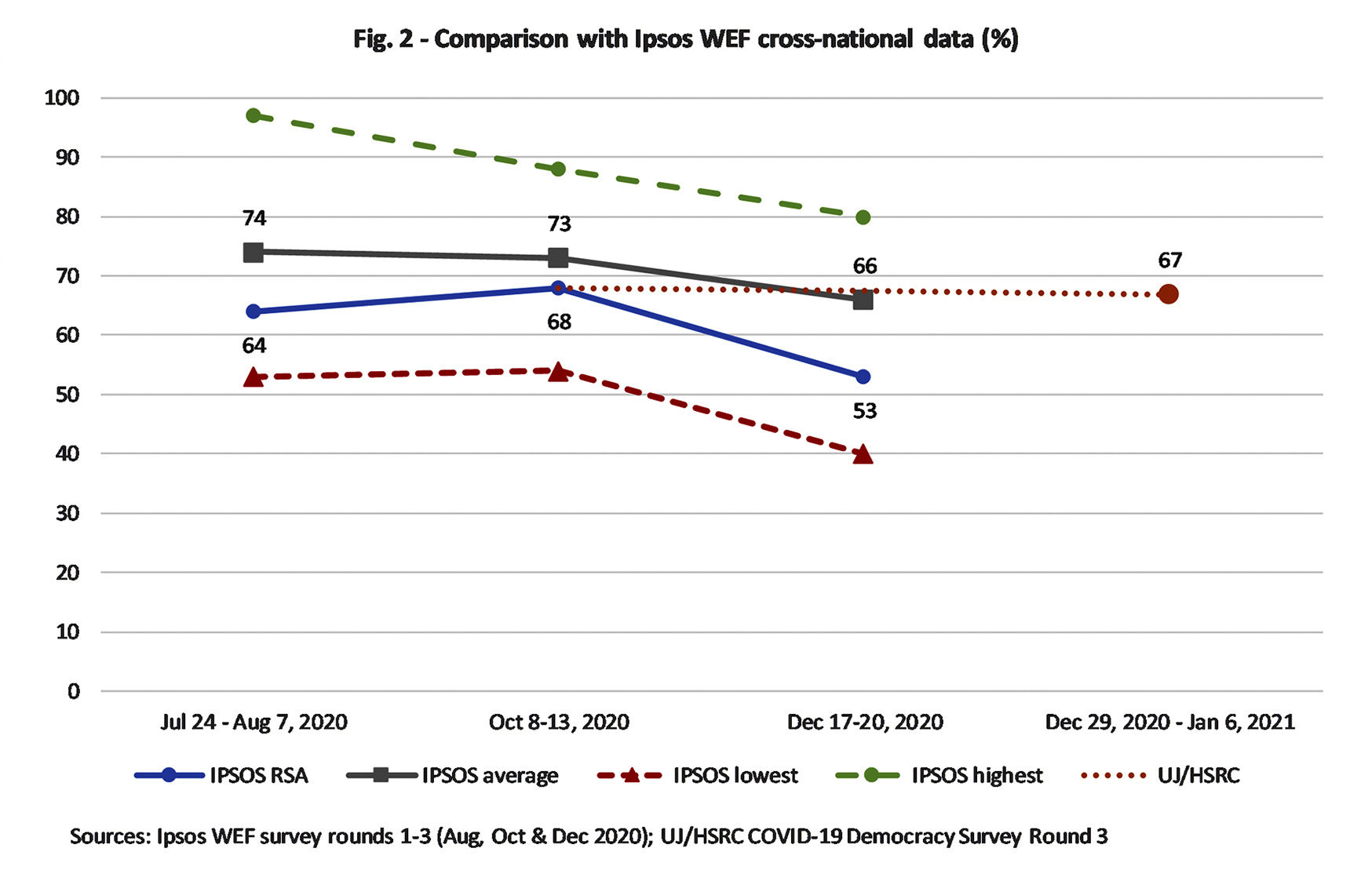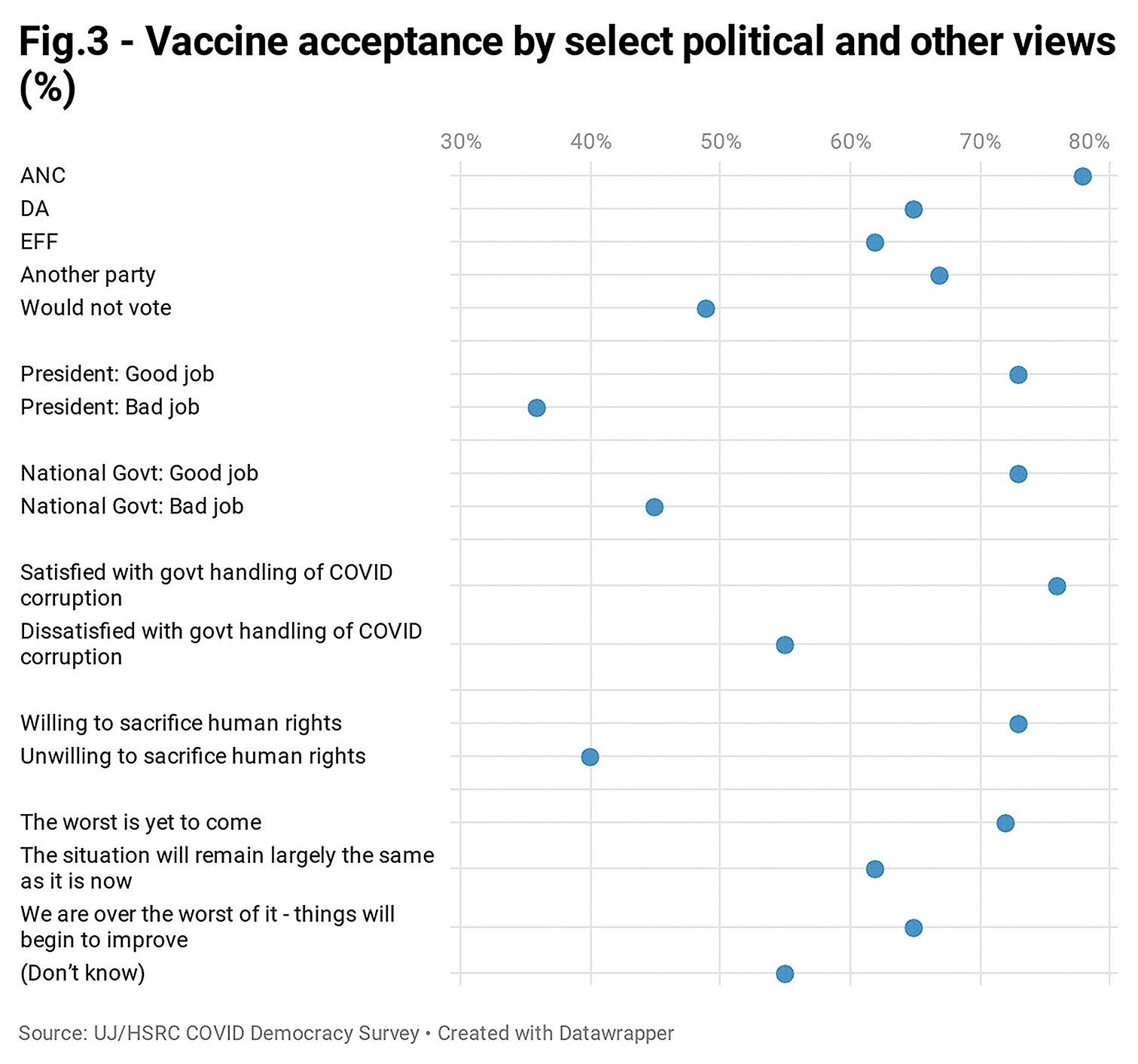MAVERICK CITIZEN
A hesitant nation? Survey shows potential acceptance of a Covid-19 vaccine in South Africa

Our survey of attitudes towards Covid-19 vaccination in South Africa shows a higher proportion of the population is willing to be vaccinated than suggested by other recent studies. About two-thirds of the population definitely or probably want the vaccine.
The Covid-19 pandemic continues to inflict appreciable burdens of morbidity and mortality in South Africa, while also causing extreme social and economic disruption. In response, ensuring an effective large-scale and equitable rollout of a Covid-19 vaccine(s) has become a pressing issue.
It has given rise to significant debate and vaccine activism, but it has also raised concerns about potential public hesitancy to receive the Covid-19 vaccine.
This issue was examined in Round 3 of the UJ-HSRC Covid-19 Democracy Survey conducted from 29 December 2020 to 6 January 2021. There were 10,618 fully completed questionnaires, a large sample. Responses were weighted by race, age and education, so that findings are broadly representative of South Africa’s adult population.
Two-thirds favour vaccines
The key question was: “If a Covid-19 vaccine became available to you, would you take it?” Two-thirds (67%) said yes, with 52% stating that they would definitely take the vaccine, and a further 14% saying they would probably take it (Figure 1). Close to a fifth provided negative responses, with 12% maintaining they would definitely not get vaccinated and an additional 6% saying they would probably not take the injection. A final 15% did not know.

With the Department of Health estimating that at least 67% of South Africa’s population need to be vaccinated to attain population (or “herd”) immunity, these results are encouraging. However, with a third of the adult population unconvinced, more public education is required to ensure a smooth rollout of vaccines.
High, low or inbetween? A comparative perspective
Our findings raise questions of a comparative nature. Are these levels of vaccine acceptance and hesitancy high or low relative to other countries? How similar or discrepant are our findings from other surveys on Covid-19 vaccination attitudes, and can any inferences be made about apparent trends over the past year?
A good starting point is the findings on potential vaccine acceptance that come from three rounds of Ipsos WEF online surveying conducted between August and December 2020. This survey’s formulation on the vaccine question was similar to our own. It read: “If a vaccine for Covid-19 were available, I would get it”. Answers were captured on a scale ranging from strong agreement to strong disagreement. South Africa was included in each round of surveying.

South Africans are, according to the Ipsos poll, far below the global average of people who would accept the Covid-19 vaccine. Out of 27 countries surveyed in August 2020, an average of 74% of respondents said they were ready to accept a vaccine. In South Africa, 64% said they would take the jab.
In October, the second Ipsos WEF survey found that the cross-national average had remained fairly stable at 73%, with a slight increase in the South African case to 68%. In December, an average of 66% of respondents in 15 countries said they were ready to accept a Covid-19 vaccine. This is a significant decline, which was particularly extreme in South Africa, where only 53% wanted to be vaccinated. The change in perceptions in South Africa between October and December is the biggest swing recorded in the global survey, though it was equalled by France.
This brings us back to the findings of the UJ/HSRC survey, which was conducted in the weeks after the third Ipsos survey (17 to 20 December). The two-thirds of adults 18 years and older who favour vaccination is in a similar range to the August and October Ipsos figures, rather than the lower December figure. Despite such differences, South Africans display middling levels of vaccine acceptance from a comparative perspective. There is also a need to take into consideration inequality in patterns of acceptance and hesitancy among the adult population. It is to this that we now turn.
An unequal acceptance: Differences in willingness to take the Covid-19 vaccine
In terms of socio-demographic patterns of acceptance, men were marginally more inclined than women to be willing to accept a Covid-19 vaccine (69% versus 65%). As for age-related associations, people 55 and older were more likely to report that they would take a vaccine than those aged 18 to 24 (74% versus 63%). However, more fine-grained analysis among this older category suggests that acceptance stood at 78% for those aged 54 to 64 but dropped off sharply to 48% among those 65 and older. This would need to be corroborated with other datasets, but, if true, it warrants urgent attention, since this represents an especially vulnerable cohort.
Attitudes to taking a Covid-19 vaccine also vary by race. White adults tend to be less accepting of vaccines than black African adults (56% versus 69%), as well as Indian (68%) and coloured (63%) adults. Education matters, too. Those with less than a matric-level education are generally more open to receiving a vaccine (72%) than either those who have completed matric (62%) or have tertiary education (59%).
Those who identify as poor display a greater tendency towards vaccination than those regarding themselves as non-poor (74% versus 67%).
Several other factors were examined beyond demographics, some of which had an appreciable bearing on vaccine acceptance. Having a household member infected with Covid-19 did not produce a large increase in willingness to take a vaccine, nor did one’s perceived likelihood of contracting the virus in coming months.
A number of political variables show a distinct association with vaccine acceptance (Figure 3). Supporters of the ruling ANC were significantly more likely to demonstrate a willingness to vaccinate (78%) than those of the DA (65%), EFF (62%), and other parties (67%). Among those who said they would not vote, backing for vaccination was only 48%.
Disillusionment plays a role. Those expressing discontent with the handling of South Africa’s Covid-19 crisis by the president and government were less favourably disposed towards vaccination than those offering positive approval ratings. Only 36% of those saying President Cyril Ramaphosa was doing a bad job were willing to take the vaccine, compared with 73% of those stating he was doing a good job. Similarly, only 45% of those rating the government’s Covid response poorly were in favour of vaccination. There was also a 21 percentage-point difference in vaccine acceptance depending on whether one was satisfied or dissatisfied with the government’s handling of Covid-related corruption (76% versus 55%).
These results speak to the significance of leadership in shaping attitudes around vaccinations. Some examples of this were found in responses to a qualitative question, asking for people’s explanation of their position. For example:
“I trust my government and therefore believe they will not provide us with something that’s not beneficial for our country.” – Coloured female, 25 to 34 years, Mangaung, Free State.
“Yes I will [get the vaccine] with pleasure as long as I get it from the trusted people who work under government, and be 100% sure that it’s a real vaccine.” – Black African male, 25 to 34 years, Carletonville, Merafong City, Gauteng.

Another notable finding relates to sacrificing certain human rights if it helps prevent the spread of the virus, with those who were willing to sacrifice some rights more favourable towards vaccination than those unwilling to sacrifice rights (73% versus 40%). In a similar vein, those who believe the pandemic is likely to make South Africans more united and supportive of one another are somewhat more accepting of vaccination than those believing the pandemic will promote interpersonal suspicion and distrust (76% versus 66%). Such patterns may reflect perceptions regarding the collective societal contribution of vaccination in potentially beating the pandemic and saving lives. There were examples of this in the qualitative quotes:
“I will get the vaccine immediately because I want to be safe from getting this Covid-19, and by doing that I will be protecting others that have not yet received the vaccine.” – Black African male, 25 to 34 years, Mangaung, Free State.
“Because I believe that if the vaccine is available more lives will be saved.” – Black African female, 18 to 24 years, informal settlement, Gauteng.
Finally, those fearing the worst of the pandemic is yet to come are slightly more likely to express acceptance of a Covid vaccine (72%) than those who feel the situation will stay the same (62%) or that we are over the worst (65%), and considerably more accepting than those voicing uncertainty about the future outlook (55%).
Conclusion
Our survey of attitudes towards Covid-19 vaccination in South Africa shows that a higher proportion of the population is willing to be vaccinated than suggested by other recent studies. About two-thirds of the population definitely or probably want the vaccine. However, despite ample evidence of the safety and efficacy of vaccines, about a third of the population are still sceptical about vaccination.
Public health communication and messaging will need to take people’s explanations for their hesitancy and opposition seriously if they are to be convincing. A follow-up Daily Maverick article we are preparing will assist with this objective. It explores people’s views for and against vaccination based on responses to a qualitative question in our survey.
This article strongly suggests that messaging should be addressed, in particular, towards better-educated people and those who are disillusioned with the government and its handling of the pandemic so far. Targeted vaccine literacy interventions will be required to help provide factual information where it is lacking, the scale of which will necessitate government partnerships with non-government and civil society organisations.
Transparency is key in addressing hesitancy, and good leadership is essential. To persuade people about the benefits of vaccination it will be necessary for Ramaphosa and other leaders in society to listen to the range of concerns, not just conspiracy theories, and address these appropriately. Through such efforts it is possible that misinformed and reticent members will be convinced to reconsider their views. DM/MC
Narnia Bohler-Muller is divisional executive and Benjamin Roberts a research director in the Developmental, Capable and Ethical State (DCES) research division at the HSRC. Kate Alexander is South African Research Chair in Social Change and Carin Runciman is director of the Centre for Social Change, both at the University of Johannesburg. Ngqapheli Mchunu is a PhD researcher in the DCES research division, HSRC.
Data were collected in the online multilingual UJ/HSRC Covid-19 Democracy Lockdown Survey from all willing respondents in South Africa aged 18 or older. The survey was administered using the #datafree Moya Messenger App on the #datafree biNu platform, or alternatively using data via https://hsrc.datafree.co/r/ujhsrc.
"Information pertaining to Covid-19, vaccines, how to control the spread of the virus and potential treatments is ever-changing. Under the South African Disaster Management Act Regulation 11(5)(c) it is prohibited to publish information through any medium with the intention to deceive people on government measures to address COVID-19. We are therefore disabling the comment section on this article in order to protect both the commenting member and ourselves from potential liability. Should you have additional information that you think we should know, please email [email protected]"



 Become an Insider
Become an Insider
Very interesting, and some unexpected stats. Enjoyed the article.
What is striking about the survey is that the less educated respondents were, the more likely they were to take the vaccine. Furthermore, being white was associated with the greatest resistance to taking the vaccine. Belief systems run deep, perhaps fuelled by a “reverse Kruger-Dunning effect”?